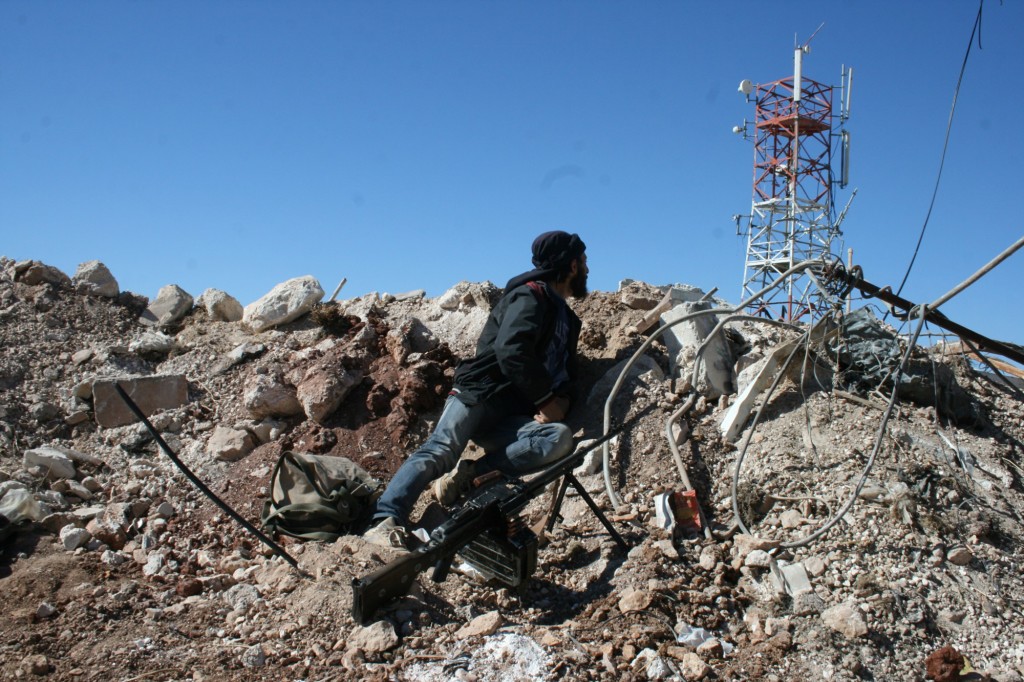As published by War Is Boring on Sept. 18, 2014
REYHANLI, Turkey—The undercover Turkish policemen had been waiting for us.
As soon I and my fellow journalist Terry Glavin returned to our hotel in this ramshackle town along the Syrian border, someone made the call. Minutes later, the cops showed up in an unmarked police van and interrupted our conversation on the street with a young Syrian refugee.
They demanded to see our passports. They told us we had to go with them to the police station for some tea. “No problem,” they promised.
Having been detained previously by secret police in Pakistan and in pre-revolution Syria, I was skeptical. I started emailing and calling people to let them know we were being rolled up.
In a bland office inside the police station, we were indeed served tea.
“Do you have any plans to go to Syria?” a mid-level police official asked us from behind his desk.
We didn’t.
“Do you know this car?” another policeman asked us. He showed us a photo on his phone of a silver car with a Syrian license plate.
“Oh, that must be Mahmoud’s car,” I said. Mahmoud—not his real name—had picked us up at the airport about an hour away in Hatay and dropped us at our hotel. Mahmoud ran a non-profit supporting Syrians. In addition to doing reporting, Terry and I were in town to support the organization by creating content for fundraising.
“Did you let your embassy know you are coming here?”
We hadn’t.
After photographing our passports, the policemen shuffled through their pages. They were particularly interested in my visa stamps for Afghanistan, Colombia, South Sudan and a few other such vacation spots.
Just a journalist, I explained.
Almost in passing, the police chief mentioned that a German wanna-be jihadist had shown up in Reyhanli two weeks back and had tried to get into Syria. The Turkish police got to him before he could go fight for Islamic State. They deported him back to Germany.
“What happened to him?” I asked.
They didn’t know. “It’s their responsibility,” the police chief said, saying Germany must now prevent him from fighting for radical Islamists.
Finally, it clicked.
A police informant saw Terry and I—two bearded foreigners—show up just a few kilometers from Syria in a car with Syrian license plates. They thought we might be planning to join ISIS.
And I had been worried about my visa.
It’s not a crazy assumption. The CIA estimates roughly 15,000 foreigners have joined up with ISIS. This includes about 700 extremists from France, more than 500 from Britain, 400 from Germany, 300 from Belgium and 100 from the United States, according to The New York Times.

In fact, Terry and I had been in Syria—but not through Reyhanli’s Bab Al Hawa border crossing. We’d traveled to the Kurdish regions of Iraq and Syria for a few days to report on the humanitarian situation of the Kurdish Yezidis, who were massacred and besieged by ISIS on Mount Sinjar in early August.
The Kurds allege that Turkey is supporting Islamic State by arming the militants, providing money and supplies, treating wounded fighters and allowing them easy access to the battlefront in Syria. Or, at the very least, they say, Turkey is letting it happen. I heard similar rumors when I was in Turkey and Syria last summer.
Since the extremist group emerged in Syria, ISIS has been fighting the Kurds. As the Kurds tell it, Turkey is happy to support the enemy of their enemy.
Anti-terrorism and intelligence units estimate about 1,000 Turkish citizens have joined Islamic State.
Once it seemed like Terry and I wouldn’t be arrested, I asked the police chief if there was any truth to these charges of collaborating with ISIS. “Absolutely not,” he said.
Indeed, Turkey has been making some efforts to stop the flow of foreign fighters across its 565-mile border with Syria.
Since 2012, Turkey has deported about a thousand “suspicious” foreigners attempting to cross the border into Syria to fight with the extremist groups ISIS or Jabhat Al Nusrah. Thankfully, I wasn’t “suspicious” enough.
Turkey’s president Recep Tayyip Erdogan said in June that his country has banned 5,300 people from its territories. Since last year, Turkey has detained more than 92,000 people trying to cross the border and denied entry to 4,000 people on a no-entry list.
According to the Turkish foreign ministry, “sometimes entire busloads” of prospective fighters were turned away.
Since the world has actually started paying attention to Islamic State, Ankara appears to be under increased pressure to stop the violent extremists. That may be part of the reason why my colleague and I were picked up and questioned.
But Turkey is being careful not to directly confront ISIS. Ankara refused to allow the United States to fly bombing missions against ISIS from Turkish soil.
ISIS is holding hostage 49 Turkish nationals, including diplomats and children who were kidnapped in June from the Turkish consulate in the northern Iraqi city of Mosul. Negotiations for their release may well be in progress.
Further, more war in Syria and Iraq means more people will seek refuge in Turkey. Nearly a million Syrian refugees are already living in Turkey.
Even if they’re not willing to fight ISIS head on, Turkey’s security services do seem to be watching carefully for potential jihadists. I alone am proof of that. It may have been a hassle—and a bit unnerving—but it’s a reassuring sign that Turkey is doing something right in the effort to stop the virulent ISIS from spreading even more.